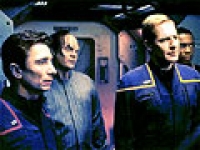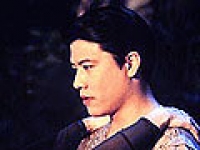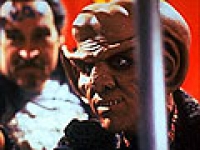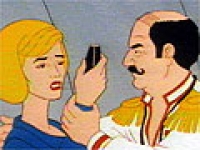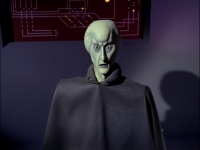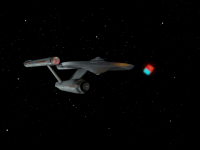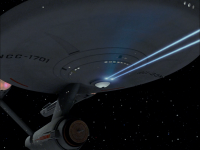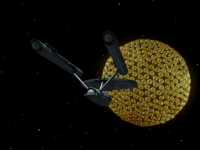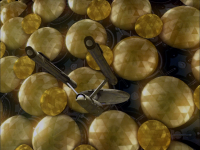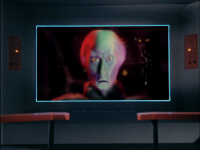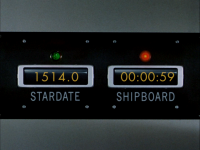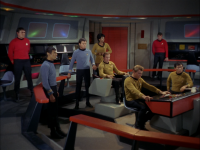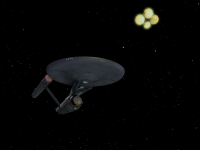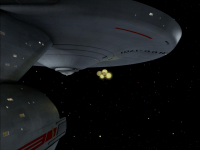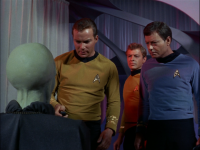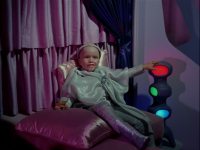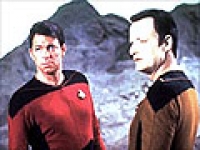Star Trek: Newest — 1x10 — No Small Parts
Synopsis
The U.S.S. Cerritos encounters a familiar enemy. Tendi helps a struggling recruit find her footing.
Remarkable scenes
- Freeman to Landru: "Hey! Don't make me paradox you into destroying yourself!"
- Ransom: "It's always weird revisiting planets from the TOS era." Freeman: "TOS?" Ransom: "It's what I call the 2260s. Stands for Those Old Scientists. You know, Spock and Scotty, those guys. Seems like they were stumbling on crazy new aliens every week back then."
- Boimler revealing Mariner's and Freeman's secret in front of everyone.
- The destruction of the Solvang.
- Freeman to Ransom: "Be as hard on her as you always are!" Mariner: "Yeah, be hard on me!" Ransom: "I'm only hard on you when you make me hard!—I mean I'm—I'm not hard right now—I mean I could—I could get hard if I wanted to—but I'm not hard right now—I'm so sorry, you're both great!"
- Mariner to Levy: "You said Wolf 359 was an inside job." Hmm. It kinda was!
- Levy: "Changelings aren't real; the Dominion War didn't happen!"
- The Ransom working out scene.
- The Cerritos under attack by the same ship that destroyed the Solvang and Freeman skillfully avoiding making the same mistake they did.
- The Cerritos' warp nacelle being torn off.
- The Pakled leader: "We want your ship pieces to add to our ship pieces so that we have all the ship pieces!"
- Rutherford's creepy reunion with Badgy.
- The Pakleds boarding the ship.
- Peanut Hamper refusing to go on the mission to sabotage the Pakled ship.
- Shaxs' noble sacrifice.
- The Titan showing up to rescue the Cerritos from more Pakleds.
- Riker: "A Pakled party and I wasn't invited?!"
- Freeman: "Did you know Starfleet considers Beta III a known culture? They have no idea the Betans have regressed. And the Pakleds, well, the Pakleds murdered the entire crew of the Solvang because everyone assumed they were a joke." Mariner: "Yeah, well, that's Starfleet. Good at observing and bad at maintaining."
- Troi: "Jack, I sense you exaggerate your confidence in order to mask an ocean of insecurity."
- Riker: "Hey, how about you buy me a drink? You know, since we're even? Remember? The thing with the aliens where I saved your ass?" Mariner: "We are not even. And we don't use money. What's happened to you man, you used to be sharp!"
- Boimler transferring to the Titan.
- Riker: "Give me warp in the factor of 5, 6, 7, 8..."
Review
There is so much to love in this wonderfully fitting season finale. We finally get to see the Titan after it was first teased way back in Star Trek X: Nemesis and a couple times on this show as well. Lower Decks is finally committing to its cameos! But we actually get much more than a cameo here. Riker and Troi get more than a mere bit part like we had with Q in Veritas or the DS9 appearance in Cupid's Errant Arrow. Plus it looks like we might end up seeing a lot of the Titan in the next season now that Boimler has transferred there. Could Lower Decks finally subvert the trope of the cool guest starship not sticking around for longer than a couple episodes the way Battlestar Galactica did with the Pegasus? Let's hope!
Speaking of subverting tropes, much of this story's narrative is taking deliberate aim at Star Trek's tendency to boldly go where no one has gone before rather than flesh out what's already there. Only on rare occasions like DS9, Enterprise season 4, parts of the Picard show, or the occasional episode of another series does Star Trek ever revisit a previous alien planet or alien species to deepen them further and build out the lore of the Star Trek universe in a way that plays nicely in the sandbox. The best fiction series build bigger and bigger sandcastles in the sandbox rather than continually starting new sandcastles off to the side or worse knocking over an old sandcastle to build another like Discovery did with its problematic relationship to canon; particularly visual canon.
Not so here. Lower Decks is showing us that its writers are capable of playing in that sandbox quite skillfully, building up and deepening previous episodes like TOS: Return of the Archons in the teaser, TNG: Samaritan Snare with the Pakleds returning as the antagonist of the week, and TNG: The Quality of Life by featuring an exocomp that has advanced even further beyond the sentience Data had proven they had attained in that episode. The Pakleds are in character trying to steal more technology and Peanut Hamper refuses to go on a life-threatening mission just as her predecessors did in their debut episode. Indeed, the exocomps developing enough to be recognized as people who can serve in Starfleet as equals to the rest of the crew delivers quite profoundly on Data's aspirations for them. You've got to wonder how they fared during the synth ban in the Picard show though. If they were all cowardly assholes like Peanut Hamper turned out to be, perhaps not so well!
This episode does more than just lazily reuse previous planets or aliens though, it also serves as a terrific commentary on the importance of reusing and deepening them. The inhabitants of Beta III reverted to worshiping Landru and the Pakleds became much more dangerous because Starfleet never bothered to check in on them often enough. Freeman even discusses this openly throughout the episode, almost as if she's criticizing Star Trek itself. When Freeman talks about the importance of checking up on these places or people more often, it's as though she's asking the writers of Star Trek to resist the temptation to do more "boldly going" and instead do some even bolder deepening of what's already there in the vast Star Trek universe, just waiting to be fleshed out better.
What a treat. We get a surprisingly impressive set of space battles and action scenes for the animated medium plus powerful, insightful, and effective meta commentary about Star Trek itself all wrapped in a neat little bow. One of Star Trek's finest (half) hours.
Star Trek: Newest — 1x10 — Et in Arcadia Ego, Part 2
Synopsis
A final confrontation on the synthetics' homeworld, Coppelius, pits Picard and his team against the Romulans, as well as the synths who seek to safeguard their existence at all costs.
Remarkable scenes
- Picard flying the La Sirena.
- Narissa: "Sad queen Annika. Six years old and all she got for her birthday was assimilated."
- Seven of Nine taking out Narissa.
- The orchids engaging the Romulan fleet.
- Riker showing up with the Federation fleet.
- Picard talking down Soji then collapsing from his brain disease.
- Picard meeting Data preserved in a simulation.
- Picard waking up in an android body.
- Picard killing Data's preserved consciousness.
Review
Suddenly the synth ban that lasted for more than a decade is gone. Why? We don't really know. We see no public debate in the Federation. We see no media coverage of how others in Federation society perceived what went down on Coppelius. We don't see fearful conservatives on FNN (The Federation News Network originally shown in the pilot episode, remember that?) pleading with the Federation legislature not to sympathize with the synths since they clearly did have the power to destroy the Federation and indeed were moments away from pushing a button that would do exactly that. It all just gets hand waved away off-screen without a moment's reflection. While it's true that many of us may fantasize about the authoritarian right simply disappearing from political power wherever they wield it as soon as possible, the real world doesn't work that way. It ought to be obvious that a single dramatic event can't just magically overturn years of reactionary attitudes entrenched in the hearts of minds of an entire society overnight. Good fiction doesn't pander to our fantasies, it reflects the actual human condition. When Star Trek is at its best it lays bare who and what we are while also giving us a realistic taste of how much better we could be. This story was far from that.
And just what were those super synths anyway? Who knows. Clearly they were just a generic villain plot device. Nobody really cares about who they are and what their civilization is. So much for seeking out out new life and new civilizations, huh? Nobody's the least bit curious about a multi-galaxy synth civilization nor all that interested in possibly dissuading them from their apparent mandate to wipe out organics whenever they're summoned Ghostbusters-style. Just blow up the beacon, sweep the problem under the rug, and pretend it never happened. Likewise let's not at all concern ourselves with what happened to Narek who suddenly disappeared from the plot never to be seen again inexplicably after pleading with Soji to destroy the beacon. His sudden disappearance was almost as cheesy as the absurdly large copy-and-paste fleets of all precisely the same ship. Hundreds of identical ships is incredibly bland and feels like yet another cheap and unrealistic way to up the stakes artificially. DS9 showed us how to do this correctly with a bunch of different types of starships working together evoking a sense of real effort both on the part of the visual effects team but also the characters in bringing to bear whatever they could muster. It's also quite dumb that they all warp out as quickly as they warp in, without even a single ship sticking around to investigate this strange new world, establish diplomatic relations, or do anything remotely in line with first contact procedures. The whole thing felt incredibly rushed.
The laziness abounds elsewhere too. CommodoreGeneral Oh delivers generic evil mustache twirler lines constantly, including a cheesy order to use "Planetary Sterilization Pattern Number 5" along with the obligatory dramatic pause before ordering the fleet to fire, giving Riker's fleet time to arrive and intercede. The Deus Ex Machina: The Tool device from the previous episode turned out to be even more ridiculous a superpower than it seemed like it would be on two different occasions in this episode. Raffi and Rios even break the fourth wall when Raffi asks "What's happening?" after it's used for the first time and Rios replies "Nothing that makes sense." It was literally a plot device that we're supposed to just accept can do basically anything. The damn thing even wrecked what was otherwise a very charming scene when Agnes referenced the Picard maneuver from TNG: The Battle only for the scene to get overwhelmed by the magic of the all powerful space ocarina. Raffi and Seven of Nine get a bit short shrifted here too apparently somehow developing a relationship which is yet another important thing that happens off-screen. Seven does however have a touching scene with Rios shortly after Picard "dies" talking about how she promised herself she would never commit another murder but failed to resist temptation when presented with the opportunity to kill Narissa, but that is one of the only well-written scenes in the episode.
Of course the elephant in the room is the final death of Data and the death and resurrection of Picard, which while compellingly presented and incredibly moving to watch are utterly offensive in their implications. Picard and Data both essentially commit suicide in this episode (Picard's suicide merely on a time delay) while endorsing numerous platitudes about how mortality supposedly gives meaning to life. Data says that peace, love, and friendship are precious because we know they cannot endure and a butterfly that lives forever is really not a butterfly at all. What the fuck? This is pseudo-intellectual garbage on par with the ending of Battlestar Galactica having all the characters throw their technology into the sun. The whole point of people inventing technology for as long as civilization has existed is to prolong the length and quality of life. While the title of the episode loosely translates to "even in paradise, there is still death," that isn't necessarily true anymore. The advent of highly advanced androids that are nearly indistinguishable from humans to whom any human consciousness can be transferred is one of the greatest inventions in human history because it could effectively make anybody immortal. And you can sure as hell bet that the vast majority of people would prefer to have themselves transferred into one of those bodies without a ten or twenty year death clock on it as Picard did shortly before euthanizing his best friend for no coherent reason.
This of course isn't the first time that Star Trek or even Data himself has mused about the value of mortality. Recall this exchange from TNG: Time's Arrow, Part 1. Data: "I have often wondered about my own mortality as I have seen others around me age. Until now it has been theoretically possible that I would live an unlimited period of time. And although some might find this attractive, to me it only reinforces the fact that I am artificial." Geordi: "I never knew how tough this must be for you. [...] Knowing that you would outlive all your friends." Data: "I expected to make new friends." Geordi: "True." Data: "And then to outlive them as well." Geordi: Now that you know that you might not?" Data: "It provides a sense of completion to my future. In a way, I am not that different from anyone else. I can now look forward to death." Geordi: "I never thought of it that way." Data: "One might also conclude that it brings me one step closer to being human. I am mortal." At first glance, it might seem as though Data valued the idea of being mortal as far back as that TNG episode. But if you look deeper at the exchange, the thing Data is expressing the most discomfort with is being different from his friends. He didn't want to be special by being immortal while everyone else must age and eventually die. But what if everyone could be as immortal as Data? It seems in that case the discomfort Data expresses in that exchange would be moot.
Better episodes of Star Trek have also more tastefully dealt with suicide. In Voy: Death Wish we see a much better version of the supposed torture that Data was said to be enduring trapped in the simulation in this episode. In that Voyager episode, a member of the Q continuum—a race of beings who are immortal—is imprisoned, suicidal, and prevented from killing himself for the rest of eternity which he argues is a kind of torture. Janeway decides to grant him asylum from the Q, then pleads with him not to kill himself with his newfound freedom from imprisonment. But he does so anyway and the narrative correctly treats this as a tragedy, in direct contrast to how the narrative glorified Data's death and Picard casually endorsing a time limit on his android body in this episode. Once upon a time Star Trek was about seeking out new life and regarding every death as a tragedy. Now it's apparently about how death is beautiful or something. To add insult to injury, this episode that celebrates Data's death and moralizes about the supposed beauty of death aired during the middle of an unprecedented global pandemic. The writers should stop and think about how those dying in the hospital when this aired would've done anything to get an ageless android body and take that as a lesson to think through the implications of the stories they tell a bit more in the future.
At first this series showed a lot of promise, but it eventually fell into the same traps that too many TV shows do. The writers structured this story more as mystery than suspense. Then when we finally got answers to the mysteries they were unsatisfying because they were premised on overwrought threats to everyone everywhere that were quickly resolved with cheap reset buttons. A story that could've been a compelling exploration of the deeper systemic reasons why the Federation so often bans whole categories of technology in fearful, reactionary ways ended up just being 10 episodes that tried to make the same point that TNG: The Measure of a Man made 31 years ago, except in a considerably drawn out and dumbed down way. Hopefully the next season aims higher than this.
Star Trek: Newest — 1x10 — Despite Yourself
Synopsis
While in unfamiliar territory, the U.S.S. Discovery crew is forced to get creative in their next efforts to survive opposing and unprecedented forces and return home.
Remarkable scenes
- Discovery jumping into the mirror universe and being attacked by Vulcan rebels.
- L'Rell activating Tyler's hidden programming.
- Tilly unexpectedly having to play captain and stumbling through the role with hilarious nervousness.
- Tilly: "Hello, this is Captain Tilly, what the heck—heck—hell—what the hell! Hold your horses!"
- Lorca retrofitting the U.S.S. Discovery into the I.S.S. Discovery.
- Tilly on her mirror universe counterpart: "She's terrifying. She's like a twisted version of everything I've ever aspired to be. I'm gonna have nightmares about myself now."
- Tyler killing Culber.
- Lorca being tossed into the agonizer booth.
- Burnham fending off her assassination attempt.
Review
Dr. Culber, may he rest in peace, asked Lorca perhaps the episode's most important question: "Do you even want [Stamets] to get better? Or did you want all this to happen?" That seems like much more than merely the emotional conspiracy theory of a grieving lover given that the closing moments of the previous episode depicted Lorca pulling out a computer, going into the "encrypted" section, accessing navigational control, and engaging in some kind of spore jump coordinates manual override shortly before the Discovery ended up jumping to the wrong place. It seems likely Lorca wanted his ship to jump into the unknown to avoid having to return to starbase 46 and face Admiral Cornwell. It's perhaps also possible Lorca might even originate from the mirror universe and wanted to return home. After all, mirror Lorca was stated to have still been at large after his failed coup against the Emperor. What if he traveled to the prime universe and replaced the original Lorca? He even said "let's go home" shortly after inputting the override. If that is the case though, it would be odd for Lorca to almost blow his cover by trying to personally answer the hail from the I.S.S. Cooper rather than asking Burnham to look up who their alter egos were before speaking to anyone from the mirror universe.
By and large, this episode is charming enough to be quite effective in spite of being almost totally irrelevant to the show's otherwise total serialization of the war with the Klingons. Numerous small details stand out as highly amusing, ranging from the hilarious Captain Tilly (now we know why Stamets called Tilly captain in Si Vis Pacem, Para Bellum!) to the fleshing out of the backstories of various characters' mirror universe counterparts. It's fun to imagine Lorca staging an uprising against the Emperor and being put down by Burnham. It would be even better if the next episode establishes the Emperor as being a descendent of Hoshi Sato. Likewise, this episode teases us with the intriguing possibility of the Discovery itself having switched places with its mirror universe counterpart; a remarkably frightening possibility that would parallel the events of TOS: Mirror, Mirror quite well. One remarkably annoying detail about this distraction from the Klingon war though is it doesn't make a lot of sense why the crew of the Discovery didn't transmit the Klingon cloak breaking algorithm they've been working on long before they jumped. Why hoard the data from their superiors?
The only real advancement in the Klingon war story we get in this episode is Tyler's continued creepy behavior. In addition to killing Dr. Culber, he is depicted reciting a Klingon prayer with L'Rell after she activates his hidden programming. Something appears to go wrong though, as she exclaims in an exacerbated fashion that the prayer should've caused him to remember his "other name." The hypothesis that Tyler is Voq seems even more likely now, but it remains a frustratingly weak narrative choice to keep withholding this revelation from the audience for the reasons stated in the review of the previous episode.
Another detail that should give us pause in this episode is the decision to make characters from the prime universe aware of events which will befall the U.S.S. Defiant a decade or so in their future during TOS: The Tholian Web and later Ent: In A Mirror, Darkly. Assuming the crew of the Discovery makes it back to their universe, which seems like a safe bet, they will return with knowledge of the demise of the Defiant and its subsumption into the mirror universe before those events take place in TOS: The Tholian Web. It's hard to imagine why they wouldn't mention this to Starfleet so they could warn the Defiant and prevent it from being lost. There are some possible reasons: for instance, someone could invoke some prototypical version of the temporal prime directive as a reason to keep silent on it. Or perhaps Lorca and his crew will be concerned if they prevent the Defiant from being subsumed into the mirror universe, it will alter their own history by preventing them from being able to use the knowledge they gain from it to return to the prime universe. But regardless, the decision to work the events of Ent: In A Mirror, Darkly into the plot of this episode means they will have to very carefully button this up later to avoid a serious plot hole, which given this show's sloppy approach to continuity so far seems like wishful thinking.
Indeed, while it is usually best to confine criticism of the show's broader approach to continuity to separate, dedicated analyses rather than repeatedly rehash such criticisms in every individual episode review, this episode offers us a remarkable new irony on that front. Ent: In A Mirror, Darkly was perhaps the best prototype for what a modernized show set in the 23rd century should look like. That episode of Enterprise showed us how to update the production quality of TOS to look much better without violating established visual continuity. More recently, Rogue One showed us how it could be done just as effectively in the Star Wars universe. But Discovery has taken a much lazier approach. They cherrypicked the plot out of Ent: In A Mirror, Darkly, and deliberately discarded the episode's central feature: an admirably rigorous respect for visual continuity. It would be like if Rogue One had completely redesigned the storm troopers or Darth Vader "because it isn't the 70s anymore." Because of this, instead of getting something as carefully crafted and stunningly impressive as Ent: In A Mirror, Darkly or Rogue One, each episode of Discovery is an exercise in seeing which piece of established canon they'll lazily throw away next, which is incredibly sad and was entirely unnecessary. Doing almost anything else would've been better than this.
But that broader criticism of one of Discovery's central premises should not play a role in how we should judge this specific episode. And when you look at this episode on its own merits, there is a lot to love. In fact, oddly, some aspects of continuity in this episode are quite additive like Ent: In A Mirror, Darkly or Rogue One rather than destructive like Discovery too often usually is. A particular highlight of this episode in that regard is its potential healing some especially stilted dialog from TOS: Mirror, Mirror in which Kirk jumps to conclusions way too quickly about how they must've been transported into a mirror universe. Perhaps by then Kirk will have read about the Discovery's encounter with the mirror universe, so it won't be such an amazingly wild guess. Plugging a plot hole with prequel plotting is partly what made Rogue One such a fine film: it finally gave us a good answer as to why the Death Star had such an obvious flaw. Perhaps Discovery will give us an answer as to why Kirk could jump to conclusions so quickly about the concept of a mirror universe in TOS: Mirror, Mirror? It's nice that not all of Discovery's contributions to continuity are so overwhelmingly problematic. Let's hope they button up that Defiant stuff correctly.
Star Trek: Newest — 1x10 — Fortunate Son
Synopsis
Enterprise must intervene when the leader of a human freighter crew sets out for revenge against alien pirates.
Remarkable scenes
- The low gravity football scene.
- Ryan regarding the transporter: "They say that for a split second you can actually feel yourself in both places at once."
- T'Pol covering for the kid playing hide and seek.
- Ryan betraying the crew of Enterprise.
- Enterprise saving the Fortunate.
Review
Another fairly good offering from Enterprise, using the prequel premise well. We're shown that fear of change extends well into the 22nd century. The "boomers" are quite set in their ways, for "warp 1.8 is good enough." We're shown that the boomers running cargo get attacked by pirates occasionally, in this case the Nausicaans. It makes sense that long periods of time alone would cause the boomers to develop their own (closed) culture and their unwillingness to receive help from their own people seems like a natural result of their isolation. I was pleased to see the episode make rather extensive use of Travis, a character I felt was being underused. I just hope his extensive experience in space starts to pay off some more, instead of constantly relying on T'Pol's Vulcan database.
Star Trek: Newest — 1x10 — Prime Factors
Synopsis
An alien leader refuses to share valuable technology with Voyager.
Remarkable scenes
- Harry discovering that he's traveled nearly 40,000 light years using this species' transporter.
- Tuvok walking in on Torres, Carey, and Seska, only to find out that Tuvok is on their side.
- Janeway's surprise and even disgust upon learning Tuvok had betrayed her trust.
- Tuvok: "My logic was not in error, but I was."
Review
These "here's another way for Voyager to get home! Oops, sorry!" plots do get rather tiresome, especially in the first freakin' season, and this one is a pretty bad offender. Not only do our aliens of the week look exactly like humans, but with a little more effort, Voyager may have been able to get the literature underground to send Voyager 40,000 light years closer to home instead of going through the unresponsive official channels and leaving when asked. That said, it is credible that people make mistakes. Voyager could have maneuvered their way into a better deal with the literature underground, but that's just not how it went down. A disappointing episode.
Star Trek: Newest — 1x10 — Move Along Home
Synopsis
Quark's attempt at deception toward a newly-encountered alien race places the space station's senior officers in a labyrinth of danger.
Filler rating: bad filler
Nothing to see here. Move along...
Remarkable scenes
- Sisko laying into Bashir for not packing his dress uniform.
- Quark after his decidedly negative reaction to the nectar: "One man's priceless is another man's useless!"
- Kira: "I'm a Bajoran administrator. This is not what I signed up for!"
- Odo laying into Primmin for letting all the senior staff disappear without noticing.
- Odo: "And don't call me constable, I'm chief of security!"
- The hopscotch game with the little girl. Hilarious!
- Morn appearances; 1. Seen just after the credits rolls walking by the camera. 2. Seen behind Quark and Sisko when they talk just after the credits.
Review
This episode has almost no substance and decidedly manufactured danger. It's completely incredible that there was no real danger; the aliens of the week should have seen that our heroes all thought it was real and pulled the plug, or at least told them they were safe. Instead they just egged on the hysteria. There's no evidence that they somehow needed unwilling participants to enjoy their time in Quark's bar, so the whole story is one giant contrived plot device.
Star Trek: Newest — 1x10 — Mudd's Passion
Synopsis
The Enterprise is ordered to find Harry Mudd, a Federation outlaw, who is accused of selling a fake love potion to miners.
Remarkable scenes
- Spock ruining Mudd's latest scheme.
- Spock getting emotional and Chapel getting pissed at Mudd for the potion's (supposed) failure.
- The whole crew being infected by the love potion.
- McCoy: "If the Enterprise had a heart I'd save her too."
- Spock: "That is an outstandingly stupid idea!"
Review
And another TOS rehash; this time by bringing back Harry Mudd. Captain Kirk tracks down Harry Mudd to arrest him. Once again, good continuity regarding Nurse Chapel's attraction to Spock is well exploited. Nothing too terribly interesting happens in this episode, though nothing too terribly boring either. It's safe to say it's a fairly average episode, excepting of course for some of the dumb things Nurse Chapel did.
Star Trek: Newest — 1x10 — The Corbomite Maneuver
Synopsis
Kirk bluffs his way past what appears to be a powerful alien.
Filler rating: bad filler
Pretty lame episode with no significant long term continuity. The factoid about Spock's parents is nonessential and can be gotten in context in later episodes when it becomes relevant.
Remarkable scenes
- McCoy purposely ignoring the red alert to make Kirk finish his physical...
- McCoy: "What am I, a doctor or a moon shuttle conductor?" (Count #1 for "I'm a doctor, not a [blah]" style lines McCoy is famous for.)
- McCoy, talking to himself: "If i jumped every time the light came on around here I'd end up talking to myself."
- The Enterprise's attempts to escape the cube and eventually destroying the cube.
- Kirk complaining about having a female yeoman.
- Sulu very quickly compensating for Bailey's delinquencies.
- Kirk determined to help the enemy in need.
Review
An episode with a terrific theme and a terrible execution. The spirit of Star Trek and the mission of the Enterprise, to peacefully seek out new life and new civilizations, is demonstrated to its fullest effect here. Despite what easily could have been an armed conflict with what appeared to be a hostile alien species, Kirk's actions prevail in cultivating a peaceful ending, complete with establishing diplomatic relations and a cultural exchange. That all sounds great until you start to examine the details of the plot more closely, at which point unless you're willing to put up with a lot of stylistic oddness, the episode comes off as largely a dramatic failure due to its overwhelming awkwardness.
There are three details of the plot which render the episode difficult to watch. The first and most obvious detail is the incredibly slow pace. I bet I could find over ten minutes of unnecessary material to cut from the episode just from the various scenes where dramatic music plays while the crew stares anxiously at the viewscreen awaiting their impending doom. It's completely unnecessary for us to spend so much time taking in closeups of each individual character's reaction to each individual plot development several times in a row. Camera focuses on viewscreen, camera focuses on crew, camera focuses on viewscreen, camera focuses on other crew... gets old fast.
But even editorial cuts to speed up the pacing wouldn't save us from the insufferable behavior of Bailey and Balok. Bailey's oft-recurring incompetence and emotional outbursts happened so frequently that I found myself largely agreeing with McCoy's flagrant questioning of why Kirk ever promoted the guy to a bridge officer in the first place. Likewise, Balok's overwrought and intensely awkward proclamations of doom and gloom at various points throughout the episode were reminiscent of the sort of bad acting you'd expect to find listening to a cheesy sci fi radio show from the 1950s. Granted, the acting on this show is not typically stellar, but Balok's was bad even for this show's standards. As for the "real" Balok revealed at the end, the less said about that aesthetic choice, the better...
The final difficult detail to deal with is Balok's shoddy reasoning for his stated motives for his actions, something which is becoming all too common on this show for antagonists. Throughout the episode, everything Kirk does just seems to irritate Balok more and more for no particular reason. Every time Kirk offers Balok the hand of truce and friendship, Balok slaps it away. He claimed he did this to rule out deception in Kirk's statements, but in so doing he gave Kirk plenty of reasons to flee and leave Balok's ship disabled in order to ensure a safe escape. Had Kirk chosen to do that, Balok never would have gotten a chance to participate in the peaceful cultural exchange he desired. As such, his tactics were flawed and worked only because of Kirk's innate desire to take questionable, unreasonable risks in the spirit of fulfilling his mission.
Star Trek: Newest — 1x10 — Hide and Q
Synopsis
Q invites Riker to join the Continuum.
Filler rating: not filler
Lots of exposition about Q here that is important in later episodes.
Remarkable scenes
- Q: "Your species is always suffering and dying."
- Q calling Worf "macro head with a micro brain."
- Q and Picard quoting Shakespeare.
- Worf regarding the "French" soldiers: "More like vicious animal things."
- Q appearing in Data's makeup and costume.
- Worf and Wesley briefly dying, then Riker using the power of the Q to undo it.
- Data casually throwing heavy debris around.
- Riker refusing to resurrect the little girl with the power of Q.
- Picard: "What is this need of yours for costumes, Q? Have you no identity of your own?"
- Worf's reaction to Picard accusing Q of being a "flim-flam man."
- Geordi: "Worf, is that your idea of sex?"
- Picard confirming that yes, Riker should feel like an idiot for everyone refusing his supernatural gifts.
Review
Here we're given a clearer motivation for why Q is so interested in humans, where he comes from, and what his relationship to the rest of his species is. It seems Q is a renegade of sorts, or at least an oddball among his own people. His fascination with humans might perhaps be his own, as it appears that his people yanked him away just as he attempted to break his word to Picard. The idea that humanity's evolution is uniquely trending towards abilities comparable to the Q and could perhaps some day pose a threat to them is also an intriguing revelation. This certainly explains why Q would be so fascinated by humans and so apparently uninterested in every other species.
Riker's story worked less well. Being so tempted by the power of the Q so easily seemed a bit out of character at times, though it was certainly satisfying to see him get somewhat humiliated at the end of the story. The highlight of the episode—aside from John de Lancie's incredibly entertaining performance as Q of course—was Riker's refusal to use the powers of the Q to save the dead girl. A heart-wrenching moment that demonstrates the spirit of Star Trek in a dark, touching, and necessary way. Picard's insistence that humanity isn't ready to wield the power of the Q shows the Federation is enlightened enough to apply the Prime Directive to itself, not just to others.
A solid episode.



